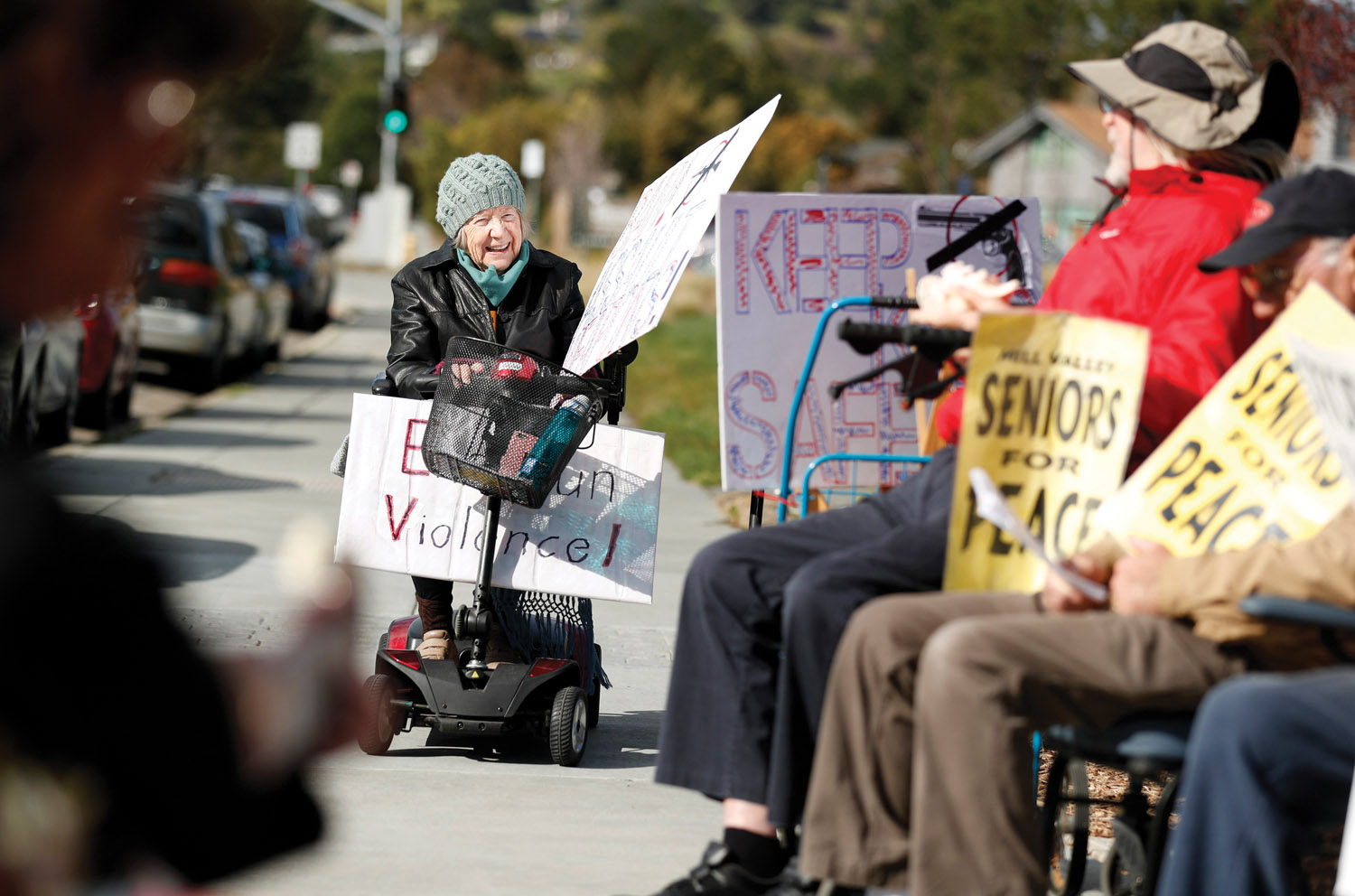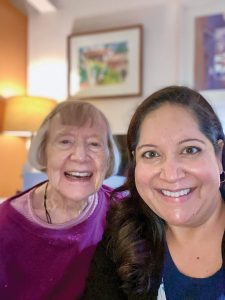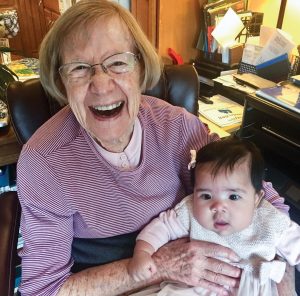
Helen Anderson ’47 took part in weekly demonstrations by seniors in Mill Valley, California, into her 90s, as seen here in 2018. Photo by Scott Strazzante / San Francisco Chronicle / Polaris
The road to my friend Helen Heyden Anderson ’47 was never long, and my heart always felt lighter crossing the Golden Gate Bridge. Her active senior community in Marin County reminded me of Blaisdell, where we lived 50 years apart.
Even at 97, Helen greeted me with bright eyes and a cheerful “Come in.” The scent of magnolia blossoms wafted through from the garden. “I was born in 1926. The flowers transport me to when I was 9, swinging from oak trees by the magnolias,” she said, remembering the San Fernando Valley ranch where she grew up. Helen entered Pomona College during World War II and was affectionately nicknamed Kanga by her suitemates, after the A.A. Milne character. In later years, she became “Great Helen” to her grandchildren and friends.
I met Helen more than 30 years ago, when I was applying to Pomona. She was leading a program addressing childhood hunger, and my friends and I raised a few thousand dollars toward her efforts. I recall visiting her ranch-style home in Tustin where Helen, surrounded by her watercolor canvases, talked about a service trip to Mexico with her husband Gordon. She was fascinated with the people she met, and I was taken with her life of service.
Her 10th decade of life found Helen leading a spirited social activist group called Seniors for Peace. With walkers and wheelchairs, Helen and some of her neighbors gathered to hold up poster board signs for various causes at a nearby intersection one afternoon a week. Her keen interest in restorative justice grew, and she worked with a group that successfully secured fair housing for low-income minorities in Marin.
During my turn as a student at Pomona, I wrote about Helen for Professor Jill Grigsby’s class called the Life Course of Women. Helen encouraged my self-designed major in economic development. I visited schools for girls in South Asia with Professor Tahir Andrabi and, like Helen, I had my first career in K-12 education. Helen subtly counseled me on my life choices when I’d ask—career changes, having a second child and recently, on moving back to Tustin from the Bay Area with my little girls. We’ll do that this summer, coming full circle. One of her greatest gifts was how she listened with gentle presence. With her advice, I’m currently managing social impact investments, including housing with dignity for lower-income Americans.
The geographies of our lives intertwined. We moved from Orange County to the Bay Area at the same time, and Helen and Gordon guided me through the wilderness of my 20s and 30s as I wrestled with life’s big decisions. On Marston Quad during one of our common reunion years, Gordon advised me, “Marry for chemistry,” he said. “And shared values,” Helen said before Gordon added, “I met Helen when she was a spry 68, and we’ve had fun since.” Helen lost Gordon to complications from COVID-19 in 2021.
Helen lived through two pandemics. When she was a senior at Pomona, she contracted polio at a friend’s wedding. In her 70s, Helen experienced late effects of the disease, but continued moving forward with a leg brace, orthotics and undeterred optimism. She remembered the dramatic impact of Dr. Jonas Salk’s polio vaccine in 1955 and found it strange that COVID-19 vaccines were politicized. (She approached people she disagreed with politically with curiosity, not judgment.)
Last year, I met with Helen as a respite to juggling my preschooler, pregnancy and increased professional responsibilities. I asked how she managed years ago as a young mother to simultaneously raise young children alone (when her first husband left), earn a master’s degree and teach.
“We had four children,” she told me. “It was still the era where women could mostly become either a teacher or a nurse. So after Pomona I became a reading specialist. My mom watched the children, which kept me afloat. It made my family so much closer after that era when we were faced with sink or swim.”
That practical attitude pervaded all Helen did. When I asked how she kept up with the news, she grinned over her Jell-O. “I scan the biggest-sized headlines first. If I can take action on it, then I’ll read more.”
Helen was remarkably resilient despite three heart blockages in her last six months. On our final visit, I asked her how she maintained her optimism. “From this age, I see the tough times,” she said. “For me, it was after Gordon was gone. It comes down to gratitude. I always wanted a spiritual tie, so I had a church community. That helped me, as well as gaining a worldview, interacting with young adults, and traveling and seeing the hardships people have. Others lifted me in my life, so I did the same.”


